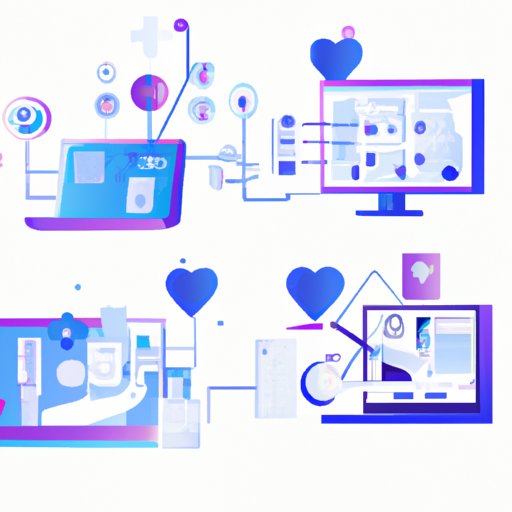Introduction
Artificial Intelligence (AI) is a rapidly developing field of technology with broad applications across many industries. In healthcare, AI is being used to improve diagnostics, automate administrative and clinical tasks, enhance patient safety and care quality, streamline healthcare delivery, engage patients, analyze big data for disease prevention, and advance medical research. This article will explore the various ways AI is being used in healthcare and the potential benefits it can bring.
Exploring AI-driven Diagnostics
One of the most promising applications of AI in healthcare is its use in diagnostics. AI-driven diagnostic tools are able to detect diseases more accurately and quickly than traditional methods. For example, AI-based algorithms can be used to identify cancerous cells from images, such as those taken from mammograms or CT scans. AI-based systems have also been used to diagnose heart conditions and skin diseases.
The benefits of using AI for diagnostics include improved accuracy, faster diagnosis, earlier detection of diseases, and reduced costs. AI-based systems can be trained to recognize patterns that may go unnoticed by physicians, allowing for more accurate diagnoses. Furthermore, AI-based systems can process large amounts of data quickly, leading to faster diagnosis and earlier detection of diseases. Finally, AI-driven diagnostics can reduce costs by reducing the need for expensive tests and procedures.

Automating Administrative and Clinical Tasks
AI can also be used to automate administrative and clinical tasks, thus freeing up time for healthcare providers to focus on patient care. AI-based systems can be used for administrative tasks such as scheduling appointments and billing, as well as clinical tasks such as drug prescribing. AI-based systems can also be used to track patient records, provide personalized care recommendations, and alert healthcare providers to potential health risks.
The benefits of using AI for administrative and clinical tasks include improved accuracy, faster processing times, and increased efficiency. AI-based systems can be trained to recognize patterns that may go unnoticed by human administrators and clinicians, leading to more accurate results. Furthermore, AI-based systems can process large amounts of data quickly, resulting in faster processing times. Finally, AI-based systems can reduce the amount of time spent on administrative and clinical tasks, leading to increased efficiency.

Improving Patient Safety and Care Quality
AI can also be used to improve patient safety and care quality. AI-based systems can be used to monitor patient health, prevent medical errors, and provide early warnings of potential health risks. For example, AI-based systems can detect changes in vital signs and alert healthcare providers to potential health risks. AI-based systems can also be used to detect adverse drug reactions and alert healthcare providers to potential problems.
The benefits of using AI for patient safety and care quality include improved accuracy, better monitoring of patient health, and fewer medical errors. AI-based systems can be trained to recognize patterns that may go unnoticed by human healthcare providers, leading to more accurate results. Furthermore, AI-based systems can monitor patient health more closely, leading to earlier detection of potential health risks. Finally, AI-based systems can reduce the number of medical errors, resulting in improved patient safety and care quality.
Streamlining Healthcare Delivery
AI can also be used to streamline healthcare delivery. AI-based systems can be used to reduce wait times, improve access to care, reduce costs, and increase efficiency. For example, AI-based systems can be used to automate appointment scheduling, which can reduce wait times and improve access to care. AI-based systems can also be used to reduce costs by identifying cost-saving opportunities and automating administrative tasks. Finally, AI-based systems can increase efficiency by automating repetitive tasks and providing decision support.
The benefits of using AI for healthcare delivery include improved access to care, reduced wait times, reduced costs, and increased efficiency. AI-based systems can automate tasks that are time consuming for healthcare providers, thus leading to reduced wait times and improved access to care. Furthermore, AI-based systems can identify cost-saving opportunities, leading to reduced costs. Finally, AI-based systems can automate repetitive tasks and provide decision support, resulting in increased efficiency.
Enhancing Patient Engagement
AI can also be used to enhance patient engagement. AI-based systems can be used to provide personalized care, improve communication between patients and providers, and enable remote monitoring. For example, AI-based systems can be used to provide personalized care plans based on an individual’s health history and current condition. AI-based systems can also be used to enable remote monitoring, allowing patients to track their own health from home.
The benefits of using AI for patient engagement include improved communication between patients and providers, personalized care plans, and improved patient satisfaction. AI-based systems can be trained to recognize patterns that may go unnoticed by human healthcare providers, leading to improved communication between patients and providers. Furthermore, AI-based systems can provide personalized care plans based on an individual’s health history and current condition, resulting in improved patient satisfaction. Finally, AI-based systems can enable remote monitoring, allowing patients to track their own health from home.
Analyzing Big Data for Disease Prevention
AI can also be used to analyze large datasets for disease prevention. AI-based systems can be used to identify patterns in data that may not be visible to humans, leading to earlier detection of diseases and improved preventive care. For example, AI-based systems can be used to identify risk factors for diseases such as diabetes or heart disease, allowing healthcare providers to take preventive measures before the disease develops.
The benefits of using AI for disease prevention include improved accuracy, earlier detection of diseases, and improved preventive care. AI-based systems can be trained to recognize patterns that may go unnoticed by humans, leading to more accurate results. Furthermore, AI-based systems can detect diseases earlier, leading to improved preventive care. Finally, AI-based systems can reduce the cost of preventive care by reducing the need for expensive tests and procedures.
Advancing Medical Research
Finally, AI can be used to advance medical research. AI-based systems can be used to accelerate drug development, improve accuracy of medical research, and identify new treatments for diseases. For example, AI-based systems can be used to identify potential new drugs faster and more accurately than traditional methods. AI-based systems can also be used to identify new treatments for diseases, such as cancer, by analyzing large datasets.
The benefits of using AI for medical research include improved accuracy, faster drug development, and improved treatments for diseases. AI-based systems can be trained to recognize patterns that may go unnoticed by human researchers, leading to more accurate results. Furthermore, AI-based systems can accelerate drug development, leading to faster treatments for diseases. Finally, AI-based systems can identify new treatments for diseases, leading to improved outcomes.
Conclusion
In conclusion, AI is being used in healthcare to improve diagnostics, automate administrative and clinical tasks, enhance patient safety and care quality, streamline healthcare delivery, engage patients, analyze big data for disease prevention, and advance medical research. The potential benefits of using AI in healthcare include improved accuracy, faster processing times, reduced costs, improved patient safety and care quality, and improved patient satisfaction. As AI continues to develop, its applications in healthcare are likely to increase, leading to even greater improvements in healthcare delivery.
(Note: Is this article not meeting your expectations? Do you have knowledge or insights to share? Unlock new opportunities and expand your reach by joining our authors team. Click Registration to join us and share your expertise with our readers.)
